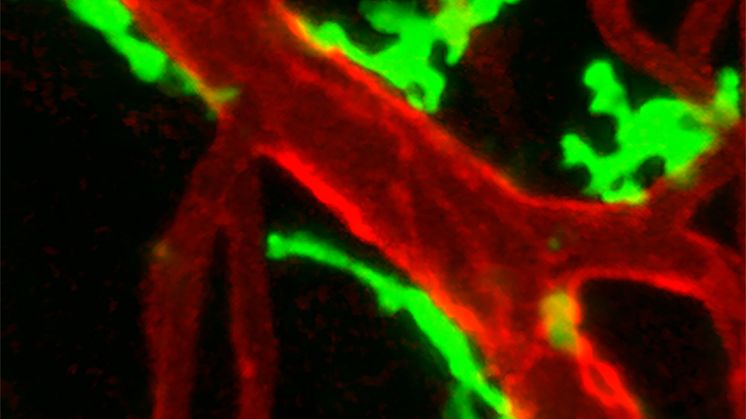
Press release -
Newly discovered immune cell function vital to healing
Cardiovascular disease, the most common cause of death, is the result of oxygen deprivation as blood perfusion to affected tissue is prevented. To halt the development of the disease and to promote healing, re-establishment of blood flow is crucial. Researchers at Uppsala University have now discovered that one of the most common immune cells in the human body, macrophages, play an important role in re-establishing and controlling blood flow, something that can be used to develop new drugs.
The classic function of immune cells is to defend the body against attacks from microorganisms and tumour cells. Macrophages are immune cells specialised in killing and consuming microorganisms but they have also been shown to be involved in wound healing and building blood vessels.
A new study published by researchers at Uppsala University demonstrates that macrophages accumulate around blood vessels in damaged tissue in mice, but also in humans after a myocardial infarction or peripheral ischemia. In mice, these macrophages could be seen to regulate blood flow, performing a necessary damage-control function. In healthy tissue, this task is carried out by blood vessel cells.
This discovery led the research group to investigate whether their findings could be developed into a new treatment to increase blood flow to damaged leg muscles, thus stimulating healing and improving function. By increasing the local concentration of certain signal substances that bind to macrophages in the damaged muscle, the research group was able to demonstrate that more macrophages accumulated around the blood vessels, improving their ability to regulate blood flow. This in turn resulted in improved healing and that the mice were able use the injured leg to a far greater extent.
“This is an entirely new function for the cells in our immune system and might mean that in future we can use immunotherapies to treat not only cancer but also cardiovascular diseases,” says Mia Phillipson, leader of the research group behind the discovery.
For further information, please contact Mia Phillipson, professor at Uppsala University’s Department of Medical Cell Biology and co-director of SciLifeLab. Tel: +46 18 471 4419, email: mia.phillispon@mcb.uu.se
Perivascular macrophages regulate blood flow following tissue damage, Circulation Research, DOI: 10.1161/CIRCRESAHA.120.318380
Topics
Uppsala University
The first University in Sweden. Quality, knowledge, and creativity since 1477. Education and research of the highest quality and relevance to society, business, and culture. Uppsala University is ranked among the world’s top higher education institutions. www.uu.se

